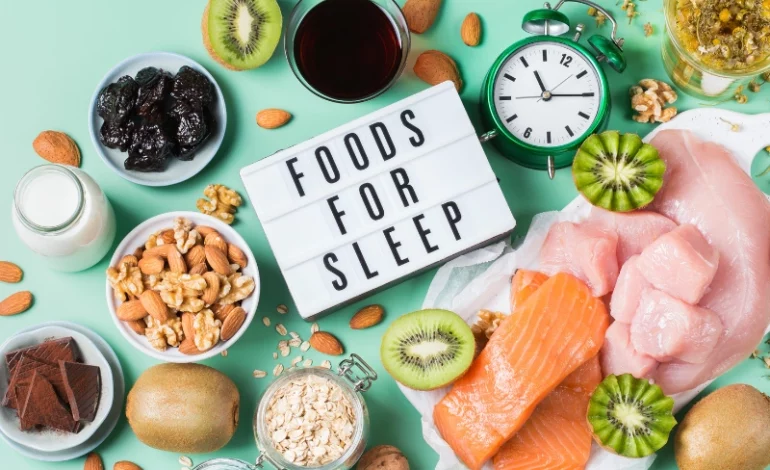Top Foods That Promote Restful Sleep

Are you tossing and turning at night, wishing for a peaceful slumber? You’re not alone. Many people struggle with getting the restful sleep they crave. But did you know that what’s on your plate can play a significant role in your nightly rest? That’s right! The foods you eat can influence how well you sleep.
Imagine settling down for the night after enjoying a dinner packed with nutrients designed to lull your body into relaxation. Sound appealing? Let’s dive into the fascinating connection between diet and sleep quality, and explore some of the top foods that can help promote those sweet dreams you’ve been longing for.
The link between diet and sleep quality
What you eat can significantly affect how well you sleep. Research shows that certain nutrients play a key role in regulating sleep patterns and promoting relaxation.
For instance, diets high in sugar and unhealthy fats can lead to restless nights. They may cause spikes in energy levels, making it harder to wind down. On the other hand, balanced meals rich in whole foods create a more conducive environment for quality rest.
The timing of your meals also matters. Eating large or heavy dinners too close to bedtime can disrupt digestion and keep you awake longer than you’d like. Instead, lighter options earlier in the evening allow your body to prepare for sleep naturally.
By being mindful of your dietary choices, you’re taking an important step toward improving not just how long you stay asleep but also the overall quality of that precious rest.
Foods that contain tryptophan, an amino acid that promotes relaxation and sleep
Tryptophan is a superstar when it comes to promoting relaxation and enhancing sleep. This essential amino acid contributes to the production of serotonin, which then converts into melatonin—the hormone that regulates your sleep-wake cycle.
You can find tryptophan in various delicious foods. Turkey often steals the spotlight, but it’s not alone. Chicken, eggs, and dairy products like yogurt and cheese are also rich sources.
Plant-based options include nuts and seeds. Almonds, sunflower seeds, and pumpkin seeds pack a powerful punch of this vital nutrient. They’re perfect for snacking before bed!
Don’t forget about legumes! Beans and lentils contribute to your daily intake while adding fiber to your diet. Combining these with whole grains can create a tasty meal that encourages restful slumber.
Incorporating tryptophan-rich foods into your evening routine may just be the key to achieving deeper sleep tonight.
The role of magnesium in promoting restful sleep and foods that are rich in this mineral
Magnesium plays a vital role in regulating neurotransmitters that send signals throughout the nervous system. This mineral helps calm the mind and body, making it easier to drift into sleep.
Many people find that magnesium-rich foods can significantly improve their sleep quality. Leafy greens like spinach and kale are excellent sources. Nuts such as almonds and cashews also pack a healthy dose of this essential nutrient.
Legumes, including black beans and lentils, contribute not only magnesium but also fiber, which is beneficial for overall health. Whole grains like brown rice and quinoa provide a steady release of energy without spiking blood sugar levels.
Incorporating these foods into your diet may help you achieve deeper rest each night. A balanced intake of magnesium can create a more peaceful environment for both body and mind during bedtime.
Melatonin-rich foods and their impact on regulating the body’s natural sleep-wake cycle
Melatonin is a hormone that helps regulate our sleep-wake cycle. It signals to the body when it’s time to rest, making its presence crucial for quality sleep.
Certain foods are naturally rich in melatonin. Incorporating them into your diet can enhance your ability to wind down at night. Cherries, especially tart varieties, are among the best sources. They can boost melatonin levels and help improve sleep duration.
Other options include bananas and grapes, both of which contain this important hormone along with other nutrients that promote relaxation.
Oats and rice also deserve mention; they not only provide carbohydrates but also support melatonin production in the body.
Eating these foods about an hour before bedtime may give you the extra nudge toward restful slumber you’ve been seeking. Balancing out your evening meals could make all the difference for a good night’s rest.
Other nutrients and compounds found in certain foods that can aid in better sleep, such
When it comes to enhancing sleep quality, several other nutrients and compounds can play a vital role. For instance, foods rich in omega-3 fatty acids like salmon and walnuts have been linked to improved sleep patterns. These healthy fats may help reduce inflammation and promote the production of serotonin, which is crucial for regulating mood and sleep.
Additionally, herbal teas such as chamomile or valerian root are popular choices known for their calming effects. Chamomile contains apigenin, an antioxidant that binds to specific receptors in the brain, promoting relaxation. Valerian root has been used for centuries as a natural remedy for insomnia.
Complex carbohydrates found in whole grains can also be beneficial. Foods like oatmeal or brown rice increase insulin levels slightly after consumption, facilitating tryptophan’s entry into the brain—leading to better restfulness at night.
Moreover, bananas come packed with potassium and vitamin B6; both contribute significantly to melatonin production. The magnesium present in avocados not only helps you relax but also supports muscle function during your slumber.
Including these nutrient-rich foods in your diet could pave the way toward achieving more restful nights filled with deep restorative sleep. Making small adjustments might lead to profound changes over time—a simple yet effective approach toward better overall well-being!









